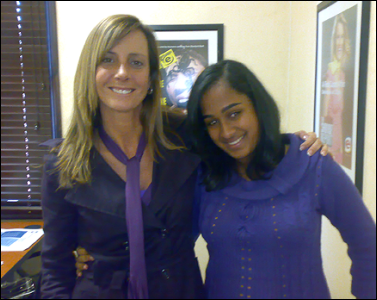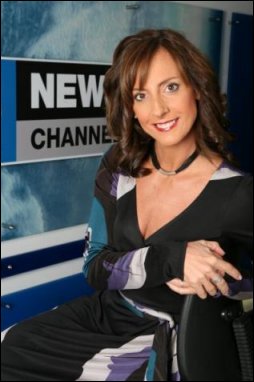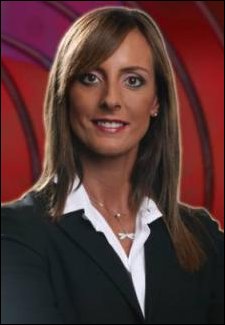No Glass Ceiling: My Interview with Debora Patta of 3rd Degree
By Michelle, age 16, South Africa

Debora Patta (left) with SDM writer Michelle.
She is the first ever female editor-in-chief in the entire broadcasting history of the African continent and she is considered by Nelson Mandela to be the best journalist in South Africa. Debora Patta, 44, is a South African journalist renowned for her grilling interview style and tough-as-nails persona. She has been in the industry for over twenty years, and her weekly investigative journalism television show on free-to-air broadcasting channel eTV, 3rd Degree, has made her a household name.
When she is not broadcasting live, going on location to various parts of South Africa, or attending management meetings, Debora spends time at home with her husband, Lance Levitas, and two children, Chiara (10) and Isabella (2). Recently the tables were turned, as I met up with Debora in the Durban eTV studios to interview her about her career from radio to television.
Michelle: What got you interested in Journalism?
Debora: To be honest, initially I had been interested in Drama.
Michelle: Really?
Debora: But it was during the 80's, politics and whatever, so I thought I couldn't study Drama - it was too frivolous. I studied politics and sociology and those kind of things [at the University of Cape Town] . I had always been interested in the idea of reading news, but the only role model I had at that stage was SABC [South African Broadcasting Corporation].
Michelle: Oh yes, eTV was not around at that time.
Debora: Yes, so I moved to Johannesburg (I had been in Cape Town then) and I heard [Talk Radio] 702. I thought, that is where I want to work! Then, suddenly I realized it was not reading the news, it was reporting on the news that I wanted to do - it was love at first sight! The first story I went on I absolutely loved it! I knew this was it - I still love it. Even today I still get a thrill going on a good story.
Michelle: What was the first story you had worked on at 702, do you remember?
Debora: Yes, I remember very clearly. The first story they put on air was about Oliver Tambo (a South African political activist) returning home from exile - there was no one else to cover it, that was the only reason I got it. Though, the first story of my own that involved research was a ridiculous story, but I put everything into it. It was in Sanddringham. There were electrical pile-ons, they wanted to put more in. They wanted to cut down the trees in order to do it. My editor said to go and count the trees and to see how many trees they would have to cut down and the type of impact it would have. It caused a huge furor, the story that I did, and it taught me that there is no such thing as a bad story, just a bad journalist. [laughs] Even though it sounded like a silly story at the time, it actually became quite a good one.
Michelle: In your opinion, which do you prefer; radio, television or print media? What do you think are their advantages and disadvantages, as well as their appeal?
Debora: They all have their appeal; I love broadcasting. Actually, my first love is radio, not television. I absolutely loved radio, it's the most incredible medium, because you can be anywhere in the world as long as you have a cell phone and you can report. So, radio is amazing. I've learned to love television. I personally wouldn't like to work in print. One of the things I like about television is the immediacy. If something happens, you can report live, whereas with print you have to wait - unless it's online.
Debora played a crucial role in the launch of eTV's 24-hour news channel last year [2008] and feels honoured to have been part of such an exceptional product. She was directly involved in employing 279 new employees for the channel which saw her then winning the Vodacom Women in the Media Awards for this feat.

2008 photo shoot just after the eNews channel was launched in July.
Michelle: Something I'd really like to know about, your investigative journalism show, 3rd Degree - what is it like? What would a typical day be like?
Debora: My main job is actually not 3rd Degree, I'm the editor-in-chief of news. That is what I mainly do, run the news.
Michelle: If I'm not mistaken, I think you are the first ever female editor-in-chief in the whole of the broadcasting history of South Africa, right?
Debora: [laughs] Actually, I think the whole of Africa ...
Michelle: Is that not daunting?
Debora: No, not at all. I mean, it's daunting, news is daunting anyway. So, no, not at all [laughs].
Michelle: Thanks, back to 3rd Degree.
Debora: So, that's my main job [editor-in-chief], and a lot of my time is spent doing news, attending meetings and launching new channels, that kind of stuff. 3rd Degree would typically be ... we have an editorial meeting every Wednesday, in which we discuss the show from the previous night [Tuesday] and crit it and then plan on upcoming shows. If I'm going on a shoot, it would usually take me a whole day - the most recent being this RDP housing scam [early July], which actually took place over a couple of days. I have a team of eight people who do research, production, and shooting. They'll get the story ready and I'll normally come in and do the interviews. I might guide them along the way, as well in terms of saying 'don't do this, do that, go here' or whatever the case may be. Sometimes I may spend a lot of time on the field on a story; sometimes if they are doing fine I'll just come in and do the interviews and the part that needs to be on-air.
Michelle: Who has been the most memorable person to interview?
Debora: I don't know, there have been a lot. Some of them are not that famous. I loved ... there was a great book called Mao's Last Dancer by Li Cunxin, who grew up in China, in abject poverty; they used to eat the bark of trees. He was chosen during the time of the communist Cultural Revolution to go and learn ballet, just because he did not cry when they stretched his leg back. And he became this world famous ballet dancer and defected to the West. It is an incredible book. You know, sometimes when you interview authors they are a letdown, not as great as the book, but he was great. He is such an amazing person. I loved interviewing Oprah Winfrey -
Michelle: You interviewed Oprah?
Debora: Three times, actually.
Michelle: Tell me more, please ...
Debora: [laughs] It was very exciting to meet somebody who was ... she is actually quite a hard person to interview, because she controls the interview. So, what she doesn't want to answer she just goes off and talks about something else. It was quite difficult for me - she is obviously a professional and is very used to television. But it was wonderful to meet her. I actually took my husband along with me; he is also a big Oprah fan [laughs]. We went to one thing where she was handing out Christmas presents to an orphanage. It was such an amazing thing, because she had made sure she had gotten the name of each person and had chosen a present specifically for them, as opposed to just generic boys and generic girls.
Michelle: Wow, what an experience.
Debora: [Nelson] Mandela is also a great person to interview. He exceeds the myth; he is greater than anything you can ever imagine, but also not an easy interview. He does not talk much about himself at all.
Michelle: What goes through your mind when you are interviewing someone? For example, with the RDP scam, what were you thinking while on the phone with Bafana Ntuli [the main person behind the RDP scam]?
Debora: Well, look, you have got to listen very carefully. I think that is the biggest mistake interviewers have made - I have certainly made it in the past myself. If you do not listen to the answer you cannot stick to a set of questions. And something like that, we had not even expected [him to phone]. You've got to just go with it. Listen to the answer and sometimes he may say something which is a contradiction to previous.
Michelle: I take it before an interview you go over what may or may not be said?
Debora: Do you mean role play? Yes, we do. I role play with my staff; they will pretend to be the interviewee. We'll go over questions, what my answers will be, and what my comebacks will be. And then we'll practice again.
Michelle: I can imagine you possibly have had many obstacles during your career. What have these obstacles been and how did you overcome them?
Debora: To be honest ... I don't think I've had obstacles. I think I have been quite lucky, and I think part of the reason is that I had never believed that there was anything stopping me in getting what I want and going where I am going. I never wanted to be in management, so that in a way has been an obstacle, because ... [laughs]
Michelle: ... Because you were never really prepared?
Debora: In a way. All I really want is to be out on the field, [all the time] and I get jealous of the reporters, because I'm like "I want to do that story too!" [laughs] - so it is quite hard, but I have learned to love it! I've learned to enjoy seeing the whole picture and being involved in other people's growth. It has definitely been a big learning curve for me. I don't think there has ever been a glass ceiling, because I never believed there was one.
Debora Patta has won numerous awards for her work both on 3rd Degree as well as off. She is known for her stories on township violence, Nelson Mandela's journey to presidency, 9/11 and the Obama election, to name a few. She has won category awards in the CNN African Journalist Awards, Checkers Woman Of The Year, and the Vodacom Women in the Media Awards. "It is always nice to be recognised by your peers - there's nothing nicer than your peers saying you have done a good job. We [3rd Degree] welcome it and we're honoured if we win the awards. It does not necessarily mean that you are the best, but it does mean you were particularly good at the time and that you did a good job."

In the same light, people still have not warmed up to her, and sadly, it seems, some never will. The media and public have used every possible angle they can to hurl attacks and abuse at her, from her previous inter-racial marriage to her "supposed bad treatment" towards non-white journalists - even in going so far as to comment on her pronunciation of words or phrases. "You have got to have the courage to take it when it comes and at the same time say that 'this is just out of line'. And when people make personal comments, I mean, I am not on-air to be a beauty queen or do anything like that. People believe that because you are on televison they can make those kind of comments; of course they are hurtful, but you also learn to just not deal with it."
Michelle: Have you seen any up-and-coming journalists whom you think have a bright future ahead of them?
Debora: Sure, I'm always looking out for good talent and then I try and recruit them [laughs] and hire them, and usually they're working for me by now.
Michelle: I bet you get asked this all the time and now is none the different: who are you inspired by? Whose work do you admire in the journalistic field? And have you any role models?
Debora: Yeah, I get asked that a lot at times ... I don't know, hey. I guess from a journalism point of view I always admire Christiane Amanpour [from CNN]. I think she is brilliant. I like the way she reports and how she is a real 'journalist's journalist'. I like the way Tony Maddox runs CNN - from a management perspective - he's got that kind of wry British humour. I wouldn't say any of them are role models, but they are people that I admire.
Michelle: What do you look for when taking in journalists at eTV?
Debora: They need to be tenacious and curious. There is no point in becoming a journalist if you are not interested in the world, interested in what happens, and how people and things work. Politics, money, history - a good journalist will understand history and be interested in history. A good journalist will read - they will read anything they can get their hands on. They will read every single newspaper, every single magazine, and every single novel - even the trashy stuff - because you want to know what is going on! You will need to understand popular culture and serious issues. You will need to read everything from The Economist to YOU magazine. I don't think journalists read enough and it drives me insane. If they send me an application which is misspelt or ungrammatical I don't even look at it!
Michelle: I get amazed that people do that, especially when they are in contact with journalists or people of the media.
Debora: It drives me to drink! I cannot bear that - no, I don't drink actually. I don't touch alcohol [laughs]. I just cannot stand that. It really is shoddy, and if people are not even prepared to do a basic spell check on their work, then I'm not interested in having them in my newsroom. I'm also interested in someone who has something different, somebody who pushes me a little bit, who is tenacious. My advice to journalists: don't knock on the door, bash it down!





